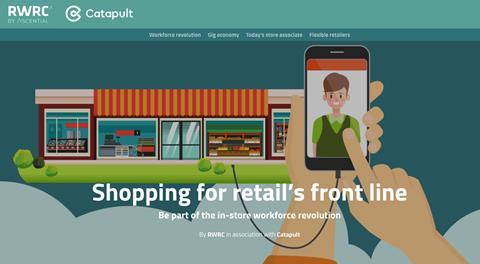PROMOTIONAL RESEARCH
UK retail is experiencing a recruitment crisis, but the flexible workforce revolution presents a potential panacea for frontline staffing.
In Shopping for Retail’s Front Line, a new interactive guide produced in association with Catapult, Retail Week explores how embracing the UK’s burgeoning gig economy – which now accounts for 4.7 million workers – could stand to benefit retailers.
Forty per cent of retailers found it difficult to retain staff over the past year, according to research from the Chartered Institute of Personnel and Development – 11% higher than for businesses outside the sector.
“36% of retailers have been forced to increase salaries to support staff retention”
Alongside the recruitment and training costs associated with high staff turnover, and a loss of revenue due to gaps in staffing, the CIPD Labour Market Outlook Summer 2019 report also found that 36% of retailers have been forced to increase salaries to support staff retention.
The shared workforce presents a potential solution for retailers to combat staff churn.
Featuring analysis of brands that have cultivated flexible workforces for their stores – including Marks & Spencer and Planet Organic – the guide reviews how temporary frontline staff can help retailers reduce fixed labour costs, manage seasonal peaks, including Christmas and January Sales, support on delivering experiential in-store formats and more.
Shopping for Retail’s Front Line also addresses the challenges behind the gig economy and covers the subject that has arguably garnered it the most column inches: zero-hours contracts.
A snapshot into the UK gig economy
The gig economy slashes recruitment costs and empowers employers to meet customer demand.
This is especially useful for retailers managing seasonal peaks, filling unexpected staff absences, launching pop-ups and special in-store events, and testing new store services.
But does it improve workers’ lives or worsen them?
A 2018 government report, The Characteristics of Those in the Gig Economy, found that 90% of people who use gig work as their main source of income were either fairly or very satisfied with their experience, followed by 71% of those who use gig work as an extra source of income.
“90% of people who use gig work as their main source of income were either fairly or very satisfied with their experience”
Furthermore, 58% said they were satisfied with the independence of their work, while 56% were satisfied with the level of flexibility offered.
On the flip side, the government research revealed that 25% of gig economy participants were either very or fairly dissatisfied with their work-related benefits and level of income, while 23% were dissatisfied with career development and training opportunities.
So, what does all this mean for retailers? Should retailers weigh up the challenges and look to embrace this revolution in how people work?
Find out in Shopping for Retail’s Front Line.
Access your free interactive guide today to discover:
- How the digital revolution is impacting frontline staffing
- What the gig economy and zero-hours contracts really mean for retailers and the true benefit to the bottom line
- How names including Marks & Spencer and Planet Organic are capitalising on shared workforces to cut costs and ramp up productivity
- Why technology and training is changing who the frontline store associate of today needs to be – and how your business can get in on the action.
































